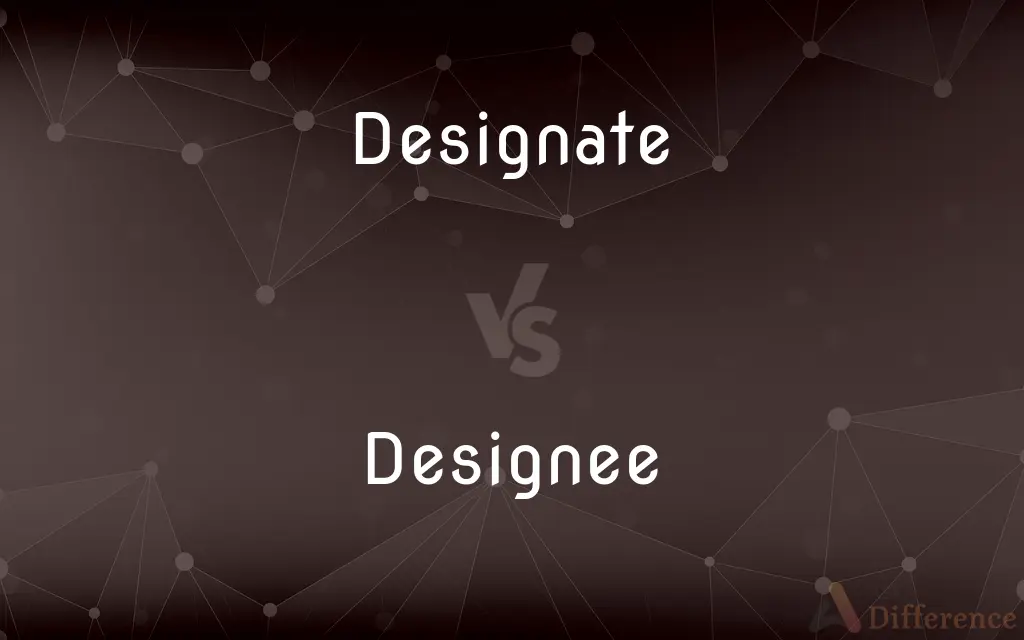Designate vs. Designee — What's the Difference?
By Tayyaba Rehman & Urooj Arif — Updated on March 19, 2024
Designate refers to the act of appointing someone, while designee is the person appointed.

Difference Between Designate and Designee
Table of Contents
ADVERTISEMENT
Key Differences
The term "designate" is used as a verb or an adjective to describe the act of nominally appointing or naming someone for a position or role, but they may not yet have assumed the position. On the other hand, "designee" is a noun referring to the person who has been designated or appointed to a role or position.
While "designate" involves the process or action of selecting someone for a role, "designee" captures the outcome of that process, specifically identifying the individual who has been selected. This distinction highlights the difference between the action of appointing and the state of being appointed.
The use of "designate" can also imply a temporary or transitional status, as the designation may occur before the official assumption of the role. In contrast, "designee" solidifies the recipient's position as the chosen one, regardless of whether they have started performing the duties associated with the role.
In practical application, "designate" is often used in official communications or procedures to announce selections or appointments before they become effective. "Designee," however, is used to refer to individuals after they have been announced or acknowledged as holding their new status, marking their readiness or commencement in fulfilling the associated responsibilities.
Comparison Chart
Part of Speech
Verb (also used as an adjective)
Noun
ADVERTISEMENT
Focus
The act of appointing or naming
The individual appointed
Usage Context
Prior to assuming a role
After being chosen for a role
Implication
Implies a future transition to a role
Confirms selection for a role
Application
Used in announcing or initiating appointments
Used to refer to individuals post-appointment
Compare with Definitions
Designate
To earmark or allocate for a specific purpose.
Funds were designated for the new project.
Designee
A person who has been appointed to a position.
The designee for the director position starts tomorrow.
Designate
To assign a particular name or title.
The area was designated as a nature reserve.
Designee
An individual chosen for a particular task.
The president's designee will represent him at the meeting.
Designate
To select someone or something for a specific role.
She was designated as the project lead.
Designee
A nominee who has been officially selected.
The designee accepted the role with gratitude.
Designate
To nominate or appoint someone to a position.
The board will designate a new CEO next week.
Designee
The recipient of a particular role or title.
The award's designee was announced at the ceremony.
Designate
To indicate or specify something.
The contract designates the responsibilities of each party.
Designee
Someone selected to perform a specific duty.
The committee's designee will handle the negotiations.
Designate
To indicate or specify; point out
A fence that designates the property boundary.
Designee
A person who has been designated.
Designate
To give a name or title to; characterize
The 1920s have been designated as the "Roaring Twenties.".
Designee
(legal) One who has been designated
Designate
To select and set aside for a duty, office, or purpose
Designated a delegate to represent our department.
Designated funds for the project.
Designate
Appointed but not yet installed in office
The commissioner designate.
Designate
Designated; appointed; chosen.
Designate
(UK) Used after a role title to indicate that the person has been selected but has yet to take up the role.
Designate
To mark out and make known; to point out; to indicate; to show; to distinguish by marks or description
To designate the boundaries of a country
To designate the rioters who are to be arrested
Designate
To call by a distinctive title; to name.
Designate
To indicate or set apart for a purpose or duty — with to or for; to designate an officer for or to the command of a post or station.
Designate
Designated; appointed; chosen.
Designate
To mark out and make known; to point out; to name; to indicate; to show; to distinguish by marks or description; to specify; as, to designate the boundaries of a country; to designate the rioters who are to be arrested.
Designate
To call by a distinctive title; to name.
Designate
To indicate or set apart for a purpose or duty; - with to or for; as, to designate an officer for or to the command of a post or station.
Designate
Assign a name or title to
Designate
Give an assignment to (a person) to a post, or assign a task to (a person)
Designate
Decree or designate beforehand;
She was destined to become a great pianist
Designate
Design or destine;
She was intended to become the director
Designate
Appointed but not yet installed in office
Common Curiosities
Is the designee always an individual?
While often an individual, a designee can also refer to an entity or organization chosen for a specific purpose.
What does it mean to designate someone?
To designate someone means to officially appoint or nominate them for a role or responsibility.
Who is a designee?
A designee is an individual who has been selected or appointed to a specific position or task.
How is a designee selected?
A designee is selected through a formal process that might involve nomination, voting, or appointment by an authority.
What is the process of designation?
The process of designation involves selecting and nominally appointing an individual or entity for a specific role, title, or responsibility.
Can an organization be a designee?
Yes, an organization can be a designee if it is selected to undertake a specific role or function.
What is the difference between a designee and a nominee?
A nominee refers to a candidate proposed for a position, while a designee is someone who has already been selected for the role.
Is the term designee used only in professional contexts?
While commonly used in professional contexts, "designee" can also apply to roles in non-professional settings.
How does one become a designee?
One becomes a designee through a formal selection or appointment process by an authoritative body or individual.
What happens after someone is designated?
After someone is designated, they typically go through a transition period before officially assuming their role or responsibilities.
Can a designate assume their role immediately?
A designate may or may not assume their role immediately, depending on the context and the specific procedures in place.
Are designates and designees part of legal processes?
Yes, designates and designees can be part of legal processes, especially in contexts involving appointments and delegations of authority.
What responsibilities do designees carry?
Designees carry responsibilities specific to the role or task for which they have been selected, which vary widely depending on the context.
Does a designee have authority?
A designee typically gains authority related to their designated role upon officially assuming their responsibilities.
Can a designee decline the designation?
Yes, a designee can decline the designation if they choose not to accept the role or responsibility.
Share Your Discovery
Previous Comparison
Tracking vs. Trekking
Next Comparison
Troubleless vs. TroubleAuthor Spotlight
Written by
Tayyaba RehmanTayyaba Rehman is a distinguished writer, currently serving as a primary contributor to askdifference.com. As a researcher in semantics and etymology, Tayyaba's passion for the complexity of languages and their distinctions has found a perfect home on the platform. Tayyaba delves into the intricacies of language, distinguishing between commonly confused words and phrases, thereby providing clarity for readers worldwide.
Co-written by
Urooj ArifUrooj is a skilled content writer at Ask Difference, known for her exceptional ability to simplify complex topics into engaging and informative content. With a passion for research and a flair for clear, concise writing, she consistently delivers articles that resonate with our diverse audience.















































